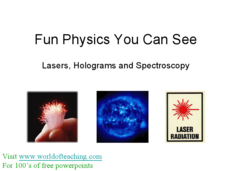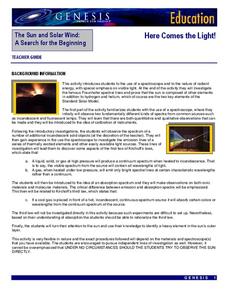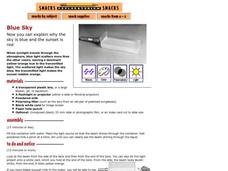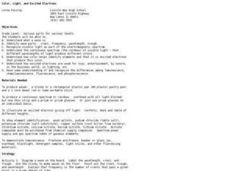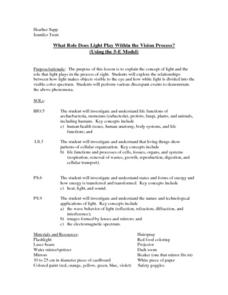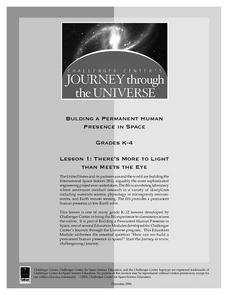Curated OER
Light
All aspects of the path of light are included in a great summary. Internal reflection and the angles of paths in different materials are explained and the behavior of visible light through lenses and the effect on focal points are...
Curated OER
Fluorescence
Here are some instructions for leading learners through a hands-on activity for investigating ultraviolet radiation. First, introduce them to light and refraction. Then introduce them to the electromagnetic spectrum. Finally, give...
Curated OER
Fun Physics You Can See
Fascinating aspects of electromagnetic radiation and its use in obtaining and transferring information are described here. Learners will find the connections to current technology interesting. Although the slides are text-heavy, they do...
NASA
What's the Frequency, Roy G. Biv?
While all light travels at the same speed, each color in the visible light spectrum contains a different wavelength and frequency. Scholars determine the relationship between frequency and wavelength as they complete the activity. They...
Cornell University
Light Waves: Grades 9-12
Explore the behavior of light waves with a lab activity. Scholars build new vocabulary through experimentation and observation. Using different mediums, they model reflection, refraction, transmission, diffusion, and scattering of light.
Urbana School District
Light
You matter, unless you multiply yourself by the speed of light ... then you energy. Presentation covers the behavior of light as both a wave and a particle, light versus sound, space travel, why objects have colors, depth perception,...
Huntington Library
Light in Painting
How do painters use and manipulate light in their artwork to give emphasis and establish mood and emotion? Pupils will analyze a few examples of landscape and portrait painting in order to explore the how light is used in art,...
Curated OER
Bioluminescence 2009: Living Light on the Deep Sea Floor Expedition - Now You See Me, Now You Don't
Students examine bioluminescence and camouflage of deep sea creatures. In this deep sea creatures lesson, students investigate the visible and near-visible light spectrum. They work in small groups to complete a light, color, and...
Curated OER
Measuring the Wavelengths of Visible Light
Students demonstrate use of an Emission tube power supply, a diffraction grating, and a scientific calculator to determine the different wavelengths of light.
Curated OER
Star Light...Star Bright
For this brightness of stars worksheet, students use a given formula using the temperature in Kelvins of a star to find its brightness. Students solve 4 problems using this equation.
NASA
Here Comes the Light!
Look beyond the light! An engaging activity introduces young scholars to the application of a spectroscope. The lesson is the fifth in a series of six and focuses on the analysis of the elements of the sun.
Curated OER
Electromagnetic Energy and Its Spectrum
Your older elementary students investigate electromagnetic energy and the electromagnetic spectrum. They will observe 7 items represented in the electromagnetic spectrum and make a poster of all the things the items have in common. After...
Mr. E. Science
The Nature of Electromagnetic Waves
Imagine a presentation that covers electromagnetic waves, electromagnetic radiation, radio waves, microwaves, the visible light spectrum, UV, X-ray, and gamma rays. Here's one. Packed with facts and colorful illustrations, 11-slide...
Curated OER
Light and Optics
In this light and optics activity, students match the light and optics vocabulary with their definitions. Students match 21 words to their definitions.
Glynn County School System
Multi-Wavelength Astronomy
Take a look at astronomy through the light lens. From radio to gamma, light waves exist in every corner of the universe. An enlightening PowerPoint presentation gives an overview of the different categories of light and then discusses...
Exploratorium
Blue Sky
Use a container full of water as a prism and show that as light is bent, the individual colors from different wavelengths become visible. This explains why the sky appears to be blue midday, and why as the sun nears the horizon, it looks...
Curated OER
Color, Light, and Excited Electrons
Investigate color, light and excited electrons and produce waves using slinkys. Your high schoolers will observe a continuous spectrum with a prism and an overhead projector. They observe flame tests to identify elements and they observe...
Curated OER
Properties of Light
In this light spectrum worksheet, students will read a diagram and a chart listing information about the different types of light rays from Gamma rays to radio waves. Then students will write a short essay about a new life-form that...
Curated OER
Light
In this light worksheet, students match 12 terms related to light and the electromagnetic spectrum to their definitions, they order waves by their speed, they analyze the energy and wavelengths of the electromagnetic spectrum and they...
Curated OER
The Components of Light
Students are given a mnemonic device to review the light spectrum as it relates to the different components of refracted light. For this components of light lesson, students read Light Magic and review the properties of light. Students...
Curated OER
Light Lab
In this light and the eye worksheet, students perform eight tests to show the blind spot in the human eye, to demonstrate Benham's disk, to show how polarized lenses work, to show how light scatters, to demonstrate fiber...
Curated OER
What Role Does Light Play Within the Vision Process?
Students are introduced to the relationship between light and vision. In groups, they participate in experiments to discover how different wavelengths are divided in the visible spectrum. They record their answers and discuss their...
Curated OER
Light 3: All Those Seeing Color, Say Eye!
Students explore the nature of light. They use on-line articles and a worksheet to explore the roles of the eye and brain in the perception of color. They draw and label a diagram illustrating the movement of light.
Curated OER
There's More to Light than Meets the Eye
Students explore the concept that not all light is visible to the
human eye. Although UV light is not visible, it can still be harmful, causing sunburns or skin cancer. They use special beads to detect UV light around the school....
Other popular searches
- Visible Light Spectrum
- Visible Light and Color
- Visible Light Middle School
- Properties of Visible Light
- Visible Light Color
- Wavelength Visible Light
- Wavelength, Visible Light
- Visible Spectrum Worksheet
- Science Visible Light




